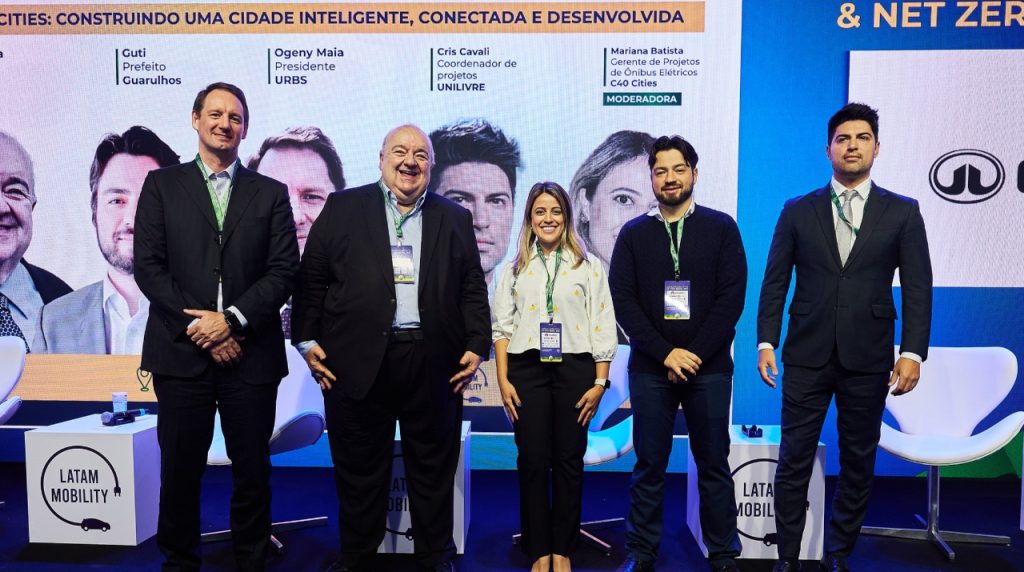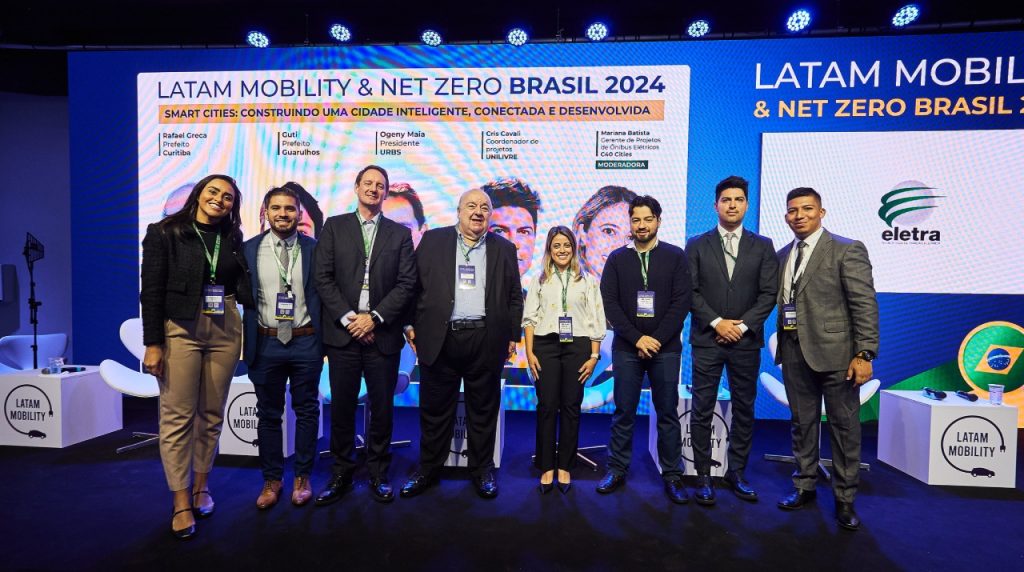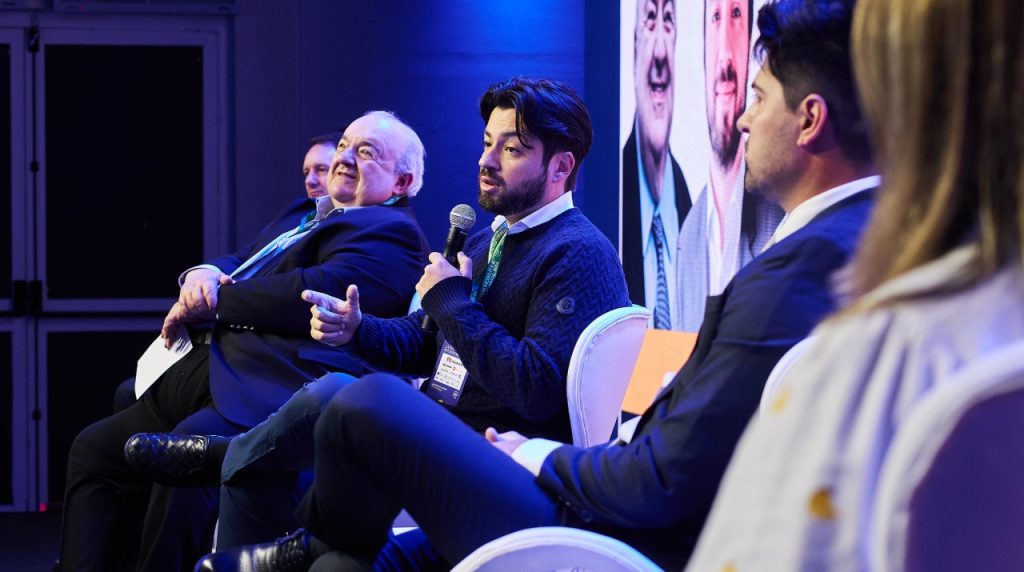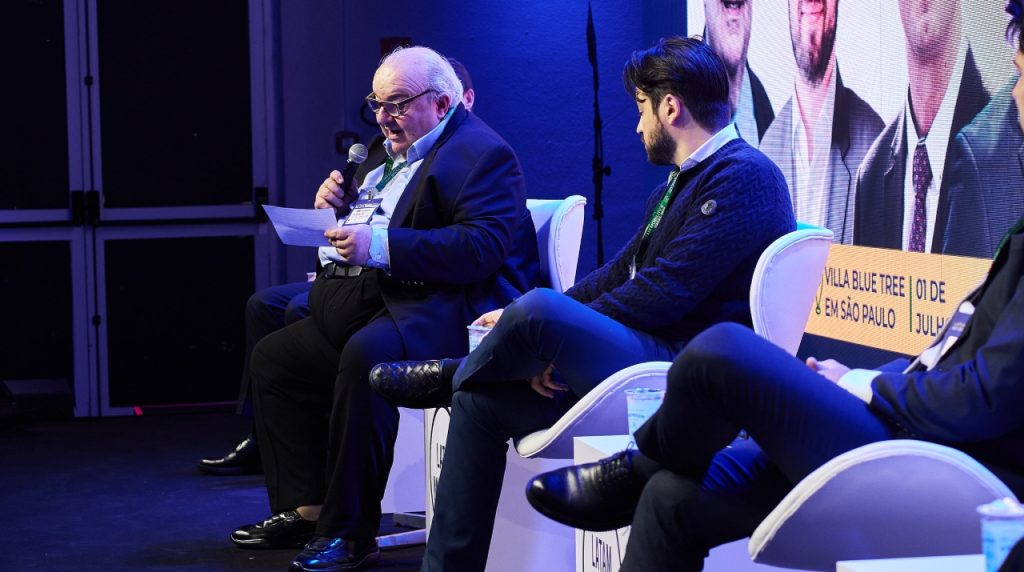
Curitiba City Hall, Guarulhos, UNILIVRE and URBS Present the Outlook on Building Smart Cities

Latam Mobility organized another high-impact meeting in Brazil to address sustainable mobility and present it as one of the pathways to global decarbonization. In this regard, one of the topics discussed was: “Smart Cities: Building a Smart, Connected, and Developed City.”
The debate was moderated by Mariana Batista, Electric Bus Project Manager at C40 Cities, who served as a liaison for the points highlighted by Rafael Greca de Macedo, Mayor of Curitiba; Guti, Mayor of Guarulhos; Ogeny Pedro Maia Neto, President of URBS; and Cris Cavali, Project Coordinator at UNILIVRE.
More than a Concept
Thus, Greca de Macedo emphasized the importance of sustainable mobility and smart cities, where technology and planning in modern urban development are key.
He stressed the need to learn from international experiences, citing recent meetings on advances in sustainable mobility in Colombia and Chile. Furthermore, he mentioned the relevance of events like Latam Mobility to promote sustainable financing and the adoption of advanced technologies.

Similarly, actions such as tree planting are essential to building greener and healthier cities, where technology and nature coexist in harmony. Finally, for Greca de Macedo, smart cities must go beyond merely incorporating advanced technology, as he emphasized that a smart city is one that provides a better quality of life for its citizens through effective governance and strategic use of technology.
Sustainable Technologies
Guti, Mayor of Guarulhos, highlighted the importance of sustainable technologies and their impact on the quality of life for citizens. Guarulhos, with 1.3 million inhabitants, is the largest non-capital city in terms of population in Brazil and has the tenth largest GDP in the country, representing about 77 billion reais.
The city’s logistics infrastructure includes Brazil’s main logistics hub and a key airport in South America. The mayor emphasized the importance of the technology used in the aeromóvel, which facilitates connectivity while being environmentally and economically advantageous.
This system has the potential to be implemented in other parts of Brazil to efficiently connect large urban centers. Guti mentioned that the project is still in the testing phase but shows great potential to significantly improve Guarulhos’s transport infrastructure and, consequently, the quality of life for its citizens.

Finally, Guti concluded by stating that a city’s true intelligence lies not only in technology but also in the services that tangibly improve the lives of its inhabitants.
Data Intelligence
Ogeny Pedro Maia Neto, President of URBS, discussed the significant advancements he has led in managing mobility in Curitiba during his seven-year tenure. Since October 2017, he has worked closely with Mayor Rafael Greca to implement a series of innovations that improved public transportation and optimized various urban services.
Maia Neto emphasized that mobility in Curitiba is not limited to public transportation but encompasses comprehensive management through bus stations, taxis, transport apps, school buses, and charters, as well as the administration of 1,100 usage permits and public restrooms.
Thus, URBS has a significant influence in all corners of the city, consolidating it as a powerful and versatile urban management company. Additionally, the implementation of the urban hypervisor centralizes all city data and facilitates access for the development of new solutions.

Finally, Maia Neto highlighted the importance of data analysis for planning and executing effective public policies, as this approach allows the development of policies that truly benefit citizens, aligning with Mayor Rafael Greca’s vision that technology is only valuable when it has a positive impact on society.
Long-term Implementation
For Cris Cavali, Project Coordinator at UNILIVRE, a city is considered smart by its ability to adapt, withstand changes, and use data efficiently for decision-making, where true intelligence lies in its citizens and managers committed to creating a legal framework that facilitates intelligent mobility management.
Together with the government of Paraná, they are revitalizing the region’s coast, an area neglected for two decades, through cycle-mobility and accessibility, ensuring that residents and tourists can enjoy the space equitably.
Additionally, Cavali mentioned water resource management as an important component of smart cities. In collaboration with Sanepar, Paraná’s sanitation company, UNILIVRE is developing new ways to capture water from the Iguazu River to Porto Amazonas.
This project is a response to extreme weather events, such as droughts and floods, that the region has experienced in recent years.
Finally, Cavali emphasized that long-term planning and nature-based solutions are crucial to facing these challenges and ensuring a sustainable water supply for the metropolitan population of Curitiba.





